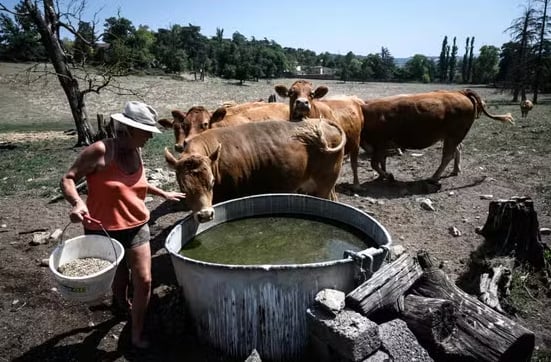December 7, 2025 | 08:23 GMT +7
December 7, 2025 | 08:23 GMT +7
Hotline: 0913.378.918
December 7, 2025 | 08:23 GMT +7
Hotline: 0913.378.918

A farmer tends to Limousin cows grazing near a farm in Brignais on August 12, 2025. JEAN-PHILIPPE KSIAZEK / AFP.
At Nicole Leroux's vegetable farm in the southwestern French village of Cendrieux, the 35 employees only harvest strawberries in the morning, from 7 am to 1 pm. "The thermometer hit 40°C on Monday, August 11, and the weather forecast calls for temperatures between 35°C and 38°C for about two weeks," Leroux said. She has tried to minimize the impact of the intense heatwave on the plants by "ventilating the greenhouses as much as possible and putting sun protection nets on the roofs."
The same restricted morning hours apply to the tomato greenhouses of Frédéric Marchesin, a producer in the village of Puch-d'Agenais, further south. He explained that working conditions improve when the greenhouses are larger and taller, with a greater air volume. This design also benefits the plants during a heatwave. However, the price difference for such structures is significant and affects the profitability of farms. Moreover, according to Marchesin, "foreign competition penalizes tomato producers' economic activity even more than the heat."
For several days, farmers across southwest France have anxiously watched the thermometer, hoping the extreme heat of August will not last. "I'm terrified of an irrigation failure and the plants not getting enough water. The trees are under water stress," said Daniel Sauvaitre, an orchardist and winegrower in Reignac. In his irrigated apple orchard, the first pickers were hard at work. The apple harvest had begun in France, starting with the reine des reinettes and gala
lemonde

(VAN) Landmark SOLAW 2025 report reminds us that resources for food are not infinite.

(VAN) Climate change is a growing concern for agricultural productivity and several studies have focused on how climate variations can impact crop yields.

(VAN) In today's fast-paced society, with people busy with their work and social lives, many dream about quitting the rat race to experience a slower pace of life, which they imagine as being more poetic.

(VAN) Mindanao’s durian industry is reaping the benefits of rising global demand, with farmers now enjoying improved market access, better farmgate prices, and stronger profitability, the Department of Agriculture in Davao Region (DA-11) reported.

(VAN) Iraq is currently grappling with one of the most severe agricultural and livestock crises in its modern history.

(VAN) The Mediterranean and the Black Sea: Fisheries sustainability concerns remain, but overfishing drops to its lowest level in a decade, while aquaculture feeds more people.

(VAN) Cargill Inc has no plans to close its U.S. beef processing plants, days after meatpacker Tyson Foods l opens new tab announced it would shutter a Nebraska facility as industry grapples with cattle supplies.